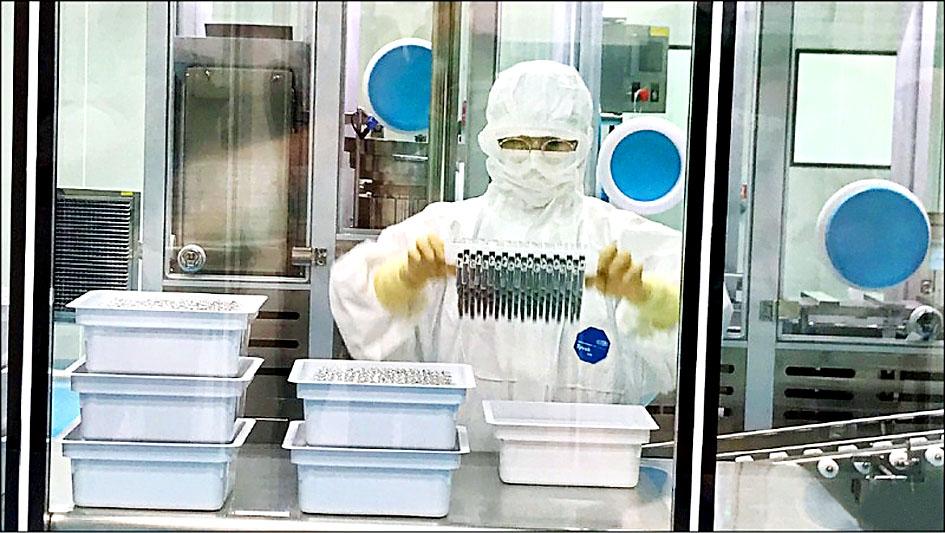Medigen Vaccine Biologics Corp (高端疫苗) on Tuesday said it has begun manufacturing its experimental COVID-19 vaccine, which it hopes to offer once it obtains an emergency use authorization (EUA).
The company has started producing antigens for its vaccine and filling them at a plant in Hsinchu, company spokesperson Leo Lee (李思賢) said by telephone.
“We hope to be able to offer our COVID-19 vaccine immediately after the Food and Drug Administration [FDA] greenlights it,” Lee said, declining to reveal how many doses the company has manufactured.

Photo: Huang Mei-chu, Taipei Times
President Tsai Ing-wen (蔡英文) has said that locally developed COVID-19 vaccines are expected to be available in July.
Medigen is running a phase 2 clinical trial of its experimental vaccine with 3,752 participants, who had been given the second shot by the end of last month, Lee said, adding that it plans to evaluate the drug’s efficacy at the end of this month.
The firm in the middle of next month would submit to health authorities its interim analysis report and hopes to gain the EUA soon, he said.
Asked if it is wise to start production when the FDA might change the vaccine formula, Lee said that the chances of that are slim, as the regulator reviewed the formula after the phase 1 trials.
“We expect two potential conclusions from the regulator’s review next month: pass or fail,” Lee said.
Medigen tested three doses of its vaccine — low, medium and high — in the phase 1 trials, with the medium dose showing the best potential, so the phase 2 trials only use the medium dose, he said.
“Even if the FDA concludes that the medium dose is not strong enough, the formula does not need to be changed, as the issue could be solved by giving people a third shot,” Lee said.
Medigen has not found serious adverse reactions or vaccine-associated enhanced diseases among participants in the phase 2 trials, it said.
An independent data monitoring committee said that its candidate is safe at a meeting on May 8, Medigen said.

South Korea’s equity benchmark yesterday crossed a new milestone just a month after surpassing the once-unthinkable 5,000 mark as surging global memory demand powers the country’s biggest chipmakers. The KOSPI advanced as much as 2.6 percent to a record 6,123, with Samsung Electronics Co and SK Hynix Inc each gaining more than 2 percent. With the benchmark now up 45 percent this year, South Korea’s stock market capitalization has also moved past France’s, following last month’s overtaking of Germany’s. Long overlooked by foreign funds, despite being undervalued, South Korean stocks have now emerged as clear winners in the global market. The so-called “artificial intelligence

‘SEISMIC SHIFT’: The researcher forecast there would be about 1.1 billion mobile shipments this year, down from 1.26 billion the prior year and erasing years of gains The global smartphone market is expected to contract 12.9 percent this year due to the unprecedented memorychip shortage, marking “a crisis like no other,” researcher International Data Corp (IDC) said. The new forecast, a dramatic revision down from earlier estimates, gives the latest accounting of the ongoing memory crunch that is affecting every corner of the electronics industry. The demand for advanced memory to power artificial intelligence (AI) tasks has drained global supply until well into next year and jeopardizes the business model of many smartphone makers. IDC forecast about 1.1 billion mobile shipments this year, down from 1.26 billion the prior

People stand in a Pokemon store in Tokyo on Thursday. One of the world highest-grossing franchises is celebrated its 30th anniversary yesterday.

Chinese artificial intelligence (AI) start-up DeepSeek’s (深度求索) latest AI model, set to be released as soon as next week, was trained on Nvidia Corp’s most advanced AI chip, the Blackwell, a senior official of US President Donald Trump’s administration said on Monday, in what could represent a violation of US export controls. The US believes DeepSeek will remove the technical indicators that might reveal its use of American AI chips, the official said, adding that the Blackwells are likely clustered at its data center in Inner Mongolia, an autonomous region of China. The person declined to say how the US government received